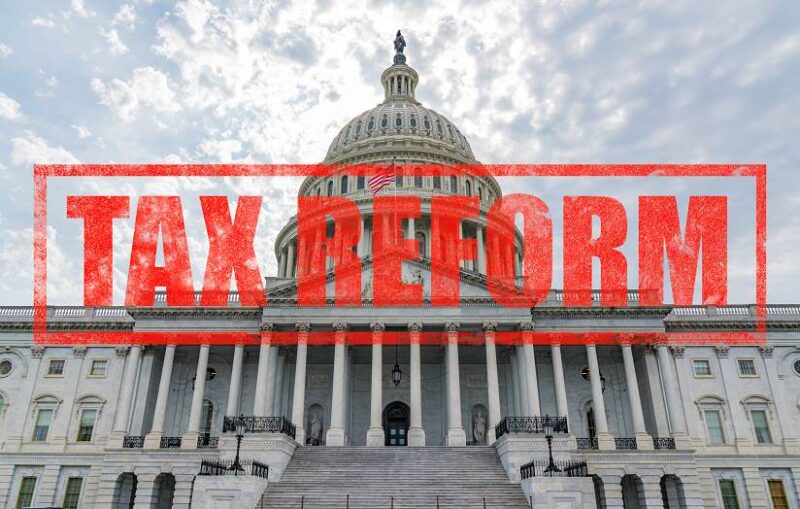What you need to know about the GOP tax reform
We examine how the Tax Cuts and Jobs Act of 2017 (TCJA) affects the tax obligations of US nonresidents
In November 2017, President Donald Trump introduced a ‘Tax Cuts and Jobs Act’ that will have wide-ranging consequences for all US tax payers.
There has been much confusion surrounding the new bill and taxpayers have been keen to work out what the changes will mean for their pockets.
Below we take a look at how the bill will affect the future tax obligations of US nonresidents. Most of the changes have taken effect from January, 2018 and will change methods of withholding and the way nonresidents will be taxed throughout 2018.
It’s important to note that these amendments do not affect the 2017 tax return filing season.
Changes to the current tax law
1) Personal exemption will be waived in full
Permanent amendment
Effective date: 31 December 2017
This change means that the personal exemption available for all nonresidents to decrease taxable income is reduced from $4,050 in 2017 to $0 in 2018 for all individuals (residents and nonresidents).
In other words, overall taxable income has increased for all nonresidents.
2) Standard deductions increase from $6,350 to $12,000
Permanent amendment
Effective date: 31 December 2017
This change will only affect students and trainees from India who are covered by an income tax treaty between the US and India. From the 2018 tax year onwards, they will be able to claim higher standard deductions on their nonresident form.
All other nonresidents are not entitled to avail of standard deductions.
3) Tuition waivers for tuition and books under Section 529(c) for university students (education next to secondary) will be taxable in full
Permanent amendment
Effective date: 31 December 2017
In previous tax years, tuition waivers under 529(c) were considered non-taxable and non-reportable. They were treated in a similar fashion as scholarships under Section 117.
However, this will no longer be the case. The Tuition waiver is now taxable as of the 2018 tax year. Scholarships under section 117 will remain non-taxable and non-reportable.
4) SALT (State and Local Taxes) will be retained for the tax years 2018 to 2025 (inclusive), but they are capped at $10,000 ($5,000 for married people who file separately)
Temporary amendment for tax years 2018 to 2025 (inclusive)
Effective date: 31 December 2016
Most nonresidents (including students and other exchange visitors) can only use SALT as an itemized deduction on their Schedule A, 1040NR form or line 11, 1040NR-EZ form. The State and Local Taxes (SALT) deduction decreases taxable income by the amount paid to state and local tax government during the tax year.
This change sets a cap on SALT deductions to $10,000 which may not affect the deduction most of the students and scholars are eligible for. However, some nonresidents paying larger state and local taxes may be unable to use all of them as a deduction.

5) State taxes paid for previous tax years during the current tax year are no longer allowed
Permanent amendment
Effective date: 31 December 2016
Under the former terms of SALT, individuals could claim state taxes for previous years that they were paying for in the current tax year. In other words, if a student paid their 2015 and 2016 state taxes during the 2017 tax year, they could claim that this added to SALT.
However, this will no longer be allowed from the 2018 tax year.
6) Miscellaneous itemized deductions are not allowed
Temporary amendment for tax years 2018 to 2025 (inclusive)
Effective date: 31 December 2017
Expenses under section – Job Expenses and Certain Miscellaneous Deductions, at Schedule A include:
- Unreimbursed employee expenses (2106 form)
- Tax preparation fees
- Other expenses (investment expenses, deposit box and etc)
Most students are not allowed to use itemized deductions (except for tax preparation fees and SALT). Additionally, some teachers, researchers and other cultural exchange visitors are eligible in some cases to use business expenses and expenses for professional equipment.
But from 2018 onwards, all of these expenses – tax preparation and business expenses – are not allowed for all resident and nonresident individuals.
7) Moving expenses are not allowed, except if a taxpayer is an employee of the US Armed Forces
Temporary amendment for tax years 2018 to 2025 (inclusive)
Effective date: 31 December 2017
Moving expenses (which are not covered by the employer) for starting a new job in the US, used to be allowed as a deduction. Usually, this deduction could not be granted to a student, however many teachers and researchers were entitled to avail of it.
But from the 2018 tax year, this deduction is suspended.
8) Expenses for personal casualty loss and theft are not allowed, except if they are under disaster area rules
Temporary amendment for tax years 2018 to 2025 (inclusive)
Effective date: 31 December 2017
While expenses for personal casualty loss and theft are very rare among students and exchange visitors, this cohort had been entitled to them. This will no longer be the case from the 2018 tax year onwards.
9) Change of the treatment of effectively connected income for nonresidents: “effectively connected with the conduct of a trade or business within the United States (within the meaning of section 864(c), determined by substituting ‘qualified trade or business (within the meaning of section 199A)’ for ‘nonresident alien individual”
Permanent amendment
Effective date: 31 December 2017
From the 2018 tax year onwards, ‘qualified trade or business’ will not include ‘trade or business of performing services as a nonresident employee’.
This change is likely to have a noticeable effect on most nonresidents income in regards to the option to treat FDAP (Fixed, Determinable, Annual or Periodic) income as effectively connected. This change will mainly affect Procedure 88-24, however, it may also affect the tax rates for employment income.
The IRS will be supplying further details on this change in the near future.
10) Withholding on employee income by the employer
Permanent amendment
Effective date: 31 December 2017
While the certificate of allowance (currently W-4) will remain the same for 2018, the calculation of the amount to be withheld was changed from 1 January 2018.
The changes surrounds ‘Notice 1036’. The main change detailed (so far) is that standard deductions allowable will be the only eligible deduction considered before the monthly (periodical) tax withholding is calculated.
As nonresident aliens do not have the right to avail of standard deductions, they will now be taxed on their whole income.
The changes must be implemented by employers before 15 February 2018.

11) Tax rates are changed into 4 brackets
Permanent amendment
Effective date: 31 December 2017
New tax brackets for a single individual:
| Income | Tax bracket |
| Not over $9,525 | 10% of taxable income |
| Over $9,525 but not over $38,700 | $952.50, plus 12% of the excess over $9,525. |
| Over $38,700 but not over $82,500 | $4,453.50, plus 22% of the excess over $38,700. |
| Over $82,500 but not over $157,500 | $14,089.50, plus 24% of the excess over $82,500 |
| Over $157,500 but not over $200,000 | $32,089.50, plus 32% of the excess over $157,500 |
Tax tables for residents and nonresidents currently in use will be waived.
Procedure 88-24
As a result of the changes in points 3, 4, 7 and 8, it is not yet clear whether Procedure 88-24 (for the treatment of scholarship as wages on W-2 form) will be waived or simply be non-beneficial anymore (except for India students and trainees who can use standard deductions under their tax treaty agreement).
Procedure 88-24 is an alternative procedure for the calculation of withholding amounts on scholarships that enable the use of personal allowances (and itemized or standard deductions) as a tax deduction, leading to a decrease in the taxable scholarship. As all of these items will no longer be available, the Procedure 88-24 will not be applicable next year.
It might also be waived by the change of the treatment of the term “trade and business” in relation to nonresidents. This treatment may cause the scholarship to be ineligible and treated as effectively connected income (wages) in the future.

Confused about your tax obligations?
Sprintax can prepare your Federal and State tax returns for you. And we guarantee to maximize your tax refund too.
The average Federal refund is over $1,000 ($1,126 in 2021).
So what are you waiting for?








